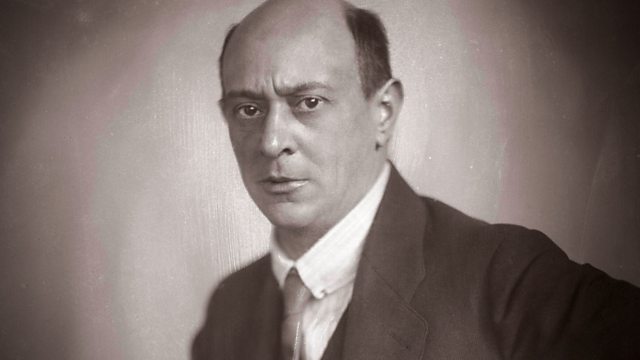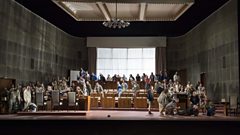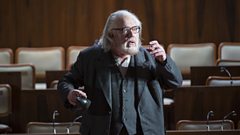
Schoenberg's Moses und Aron
From the Wales Millennium Centre in Cardiff, Schoenberg's Moses und Aron performed by Welsh National Opera and conducted by Lotha Koenigs. The cast features John Tomlinson.
Presented by Christopher Cook.
A rare opportunity to hear Arnold Schoenberg's masterpiece "Moses und Aron" from Welsh National Opera. Loosely drawn from the biblical stories of Moses, his brother Aaron and the flight of the Jews from Egypt, the opera is a culmination of Schoenberg's pre-occupation with musico-dramatic form and the prevailing cultural conflicts of the 1920s and 30s. Responding to the rise of fascism and anti-semitic rhetoric, in this old testament adaptation, Schoenberg reconnects with his own Jewish identity and faith as Moses, a spoken role, performed here by Sir John Tomlinson, struggles to overcome his despair that he will be unable to find the right words to tell the people of God's will.
Still incomplete at Schoenberg's death in 1951, the two acts performed in WNO's new production nonetheless reach a dramatic point of conclusion, when the gap between Moses, acting under the direct authority of God, and Aron, whose talent for communication presents persuasive, yet confusing images to the chosen people, widens to become morally irreconcilable.
Moses ..... John Tomlinson (Speaker)
Aron ...... Mark le Brocq (Tenor)
A Young Maiden/First Naked Virgin ..... Elizabeth Atherton (Soprano)
A Youth ..... Alexander Sprague (Tenor)
Another Man/Ephraimite ..... Daniel Grice (Baritone)
A Priest ..... Richard Wiegold (Bass)
First Elder ..... Julian Boyce (Bass)
Second Elder ..... Laurence Cole (Bass)
Third Elder ..... Alastair Moore/Julian Boyce (Bass)
Sick Woman/Fourth Naked Virgin ..... Rebecca Afonwy-Jones (Mezzo-soprano)
Naked Youth ..... Edmond Choo (Tenor)
Second Naked Virgin ..... Fiona Harrison (Soprano)
Third Naked Virgin ..... Louise Ratcliffe (Mezzo-soprano)
Chorus of six solo voices ..... Fiona Harrison (Soprano), Amanda Baldwin, Sian Meinir (Mezzo-sopranos), Peter Wilman (Tenor), Alastair Moore/Alastair Merry, Laurence Cole (Basses)
Chorus and Extra Chorus of Welsh National Opera
Orchestra of Welsh National Opera
Lothar Koenigs (Conductor).
Last on
More episodes
Previous
Clips
Synopsis
Moses has the conviction and the authority to lead his people out of oppression but it is his brother Aron whose facility with words enables him to convince the people to follow a new god. They join together in power but their differences ultimately tear them apart.
ACT I
Moses hears the voice of God. It asks him to lead his people out of Egyptian servitude and to instil in them a belief in the One and Only. Moses quails at the task, pleading old age and the ‘clumsiness of his tongue’. The voice promises him the help of his brother Aron, whose words will work miracles in the minds of the people.
��
The two brothers, Moses and Aron, are both inspired and daunted by the divine mission. They struggle to find an explanation of that which cannot be explained: an understanding of the invisible and inconceivable God.
��
The news spreads that Moses has returned, together with Aron, in order to announce a new god. The people, who have suffered since Moses killed an Egyptian slave-driver, are apprehensive and fear retribution.The people besiege Moses and Aron with questions about the new god. They become enraged when they cannot grasp the concept of an invisible deity.
��
Moses is frustrated when he is unable to explain how God can be perceived only within oneself. Aron tries to help the people understand by performing three miracles of transformation. Aron interprets the miracle of the staff transforming itself into a snake as an allegory of divine law: spiritual flexibility is required for its understanding. Authority and intelligence, which are necessary qualities for leaders, are united in Moses and Aron. Moses’s hand, which appears leprous, is healed when he places it over his heart, where God dwells. Pouring Nile water, which appears to change to blood, Aron explains that the blood of the Hebrews has been nurturing the land of their oppressors for generations. God would free them and lead them to a land where milk and honey flow. The power of the Egyptians, however, would be washed away in the floods of the Nile.
��
Aron’s inspired words reach the people’s hearts. They become aware of being chosen and, led by Moses and Aron, venture to begin the fight for freedom.
��
ACT II
The people’s exodus from Egypt has led them into the wasteland. Moses has been on the mountain of revelation for forty days and has not yet returned. The people have lost their belief in him and want to turn away from the invisible god. Aron is unable to explain his brother’s actions. The people plead with the elders to be given back the old gods and their laws. Aron is ready for a compromise and prepares to provide them with an image of their longings and wishes.
��
The people become more and more enthralled by the drawing power of the image. It shows the preparation of animal sacrifices, the dances of the slaughterers, the slaughter of the animals, burnt offerings, the miraculous healing of a sick woman and the ritual murder of a young man protesting against idolatry. After much drinking and dancing the worship culminates in the ritual sacrifice of four naked virgins. Devastation, suicide and erotic orgies follow.
��
Moses descends from the mountain. At his words, the image, created by Aron, vanishes. Moses challenges his brother’s decision to act against the divine command. Aron insists on the people’s need of the image, which he had used to fill the vacuum Moses had left. For Moses, an existence without the idea of God seems worthless.
��
Aron argues that the laws which Moses has been given by God can only give the people a limited view, ��that they struggle to understand. In despair, Moses destroys the laws. Aron denounces him, saying that he will continue to keep the idea of God alive by putting it into words. He joins the people as they continue their journey to the promised ��land.
��
Moses is left behind. Aron has put words and images to that which cannot be expressed and has destroyed his brother’s absolute perception of God. For Moses, God has become silent.
Broadcast
- Mon 16 Jun 2014 19:30����ý Radio 3




